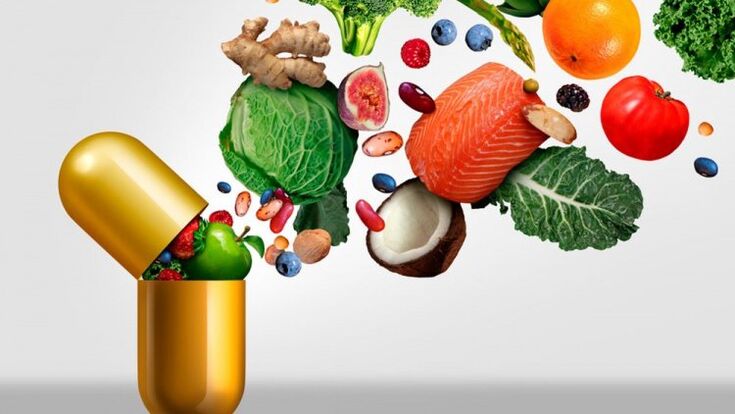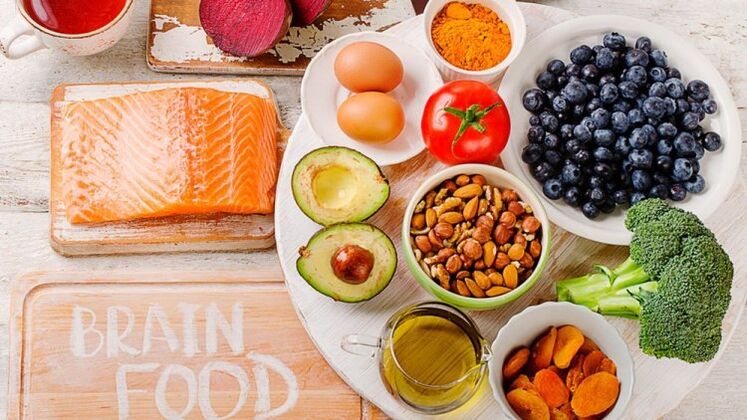Insufficient amounts of vitamins in the human body will negatively affect brain activity, leading to disturbances in cognitive functions. The main signs of vitamin deficiency are loss of ability to perceive and remember information, impaired attention, forgetfulness, forgetfulness, lethargy, fatigue, bad mood.
To prevent this, take regular vitamin supplements and add foods to your diet that improve brain function.
What is the role of vitamins?
The basic root of the word "vitamin" means life. Indeed, the body's ability to function correctly and efficiently depends on the organic matter we assimilate with food.
Vitamins help the body perform the following functions:
- They produce collagen, which strengthens and improves the firmness and elasticity of tissues, including vessel walls. This leads to improved blood formation and brain nourishment.
- Promotes the acceleration of redox reactions, thereby increasing metabolism, releasing energy from proteins, fats, carbohydrates.
- Possessing antioxidant properties, they prevent cell damage by the products of biochemical reactions.
To maintain active brain activity, it is necessary to constantly monitor the balance of vitamins and minerals. And in case of deficiency, replenish your vitamin stores by choosing the right foods and taking multivitamins containing various low-molecular-weight organic compounds.
What vitamins are needed for the brain?

Cognitive brain dysfunction is more common with age. Among the causes of this condition, there are endocrine disorders (thyroid, metabolic), pathologies of the digestive system, frequent stress and excessive physical activity that require large energy expenditures. In this case, vitamins should come to the rescue. Among the large number of them, one can single out the main ones that ensure the efficient functioning of the brain. Including:
Beta carotene
Orange yellow pigment converts into vitamin A. Protects brain cells, prevents loss of cognitive function, promotes the development of memory. The inefficiency of the pigment threatens the pathology of the organs of vision, negatively affects growth and development in childhood.
Vitamin B
They are represented by a whole group, and each of its representatives is of great importance for the human body:
- Thiamine (B1) helps to absorb carbohydrates and store energy, its deficiency destroys the digestive system;
- riboflavin (B2) promotes efficient oxygen absorption, reduces fatigue, provides energy for the body;
- nicotinic acid (B3) - powerful antioxidant, dilates blood vessels, indicated for use in cases of impaired blood supply;
- pantothenic acid (B5) - participates in the metabolism of proteins, fats, carbohydrates, synthesis of acetylcholine, helps to transmit nerve impulses to the brain;
- pyridoxine (B6) - produces hormones responsible for cognitive processes, synthesis of proteolytic enzymes and is necessary for the creation of new cells;
- folic acid (B9) - promotes cell reproduction, the formation of serotonin, adrenaline, dopamine, necessary for pregnant women for the development of the fetus;
- cyanocobalamin (B12) - reduces bad cholesterol, strengthens vascular walls, participates in the synthesis of amino acids and DNA.
Ascorbic Acid (Vitamin C)
It prevents the degeneration of brain cells, helping the gland to be better absorbed. In combination with tocopherol, it is used in the treatment of pathologies associated with impaired blood supply, reducing the risk of developing a malignant tumor.
Calciferol (Vitamin D)
It activates the assimilation of phosphorus and calcium, which is part of brain cells, improves cognitive abilities (memory, attention), mood. The lack of this organic compound becomes the cause of the development of cognitive impairment.
Vitamin K
It is represented by a group of fat-soluble compounds - phylloquinone (K1) and menaquinone (K2), which are responsible for the functioning of blood vessels and blood clotting. Thanks to him, calcium is absorbed more easily. This deficiency threatens the blockage of blood vessels, the development of amnesia and a violation of hematopoiesis.
Tocopherol (vitamin E)
As a potent antioxidant, it protects nerve cells from toxins and free radicals, improves memory properties and slows down the aging process.
Polyunsaturated fats – known as omega-3 fats – also work to improve brain performance. They affect neuroplasticity, increase concentration and reduce the risk of developing Alzheimer's disease.
Food for better brain function

The main activity of the brain is to transmit commands to carry out the vital functions of the body. To maintain a well-coordinated work, he needs good nutrition. The food consumed must contain useful vitamins and minerals.
Here is a list of brain-healthy foods that you need to regularly include in your diet:
- Nuts (walnuts, pine nuts, almonds): include polyunsaturated acids, vitamins B1, B2, C, carotenes, as well as iron, iodine, magnesium, zinc, . . . They prevent agingearly of the body, activate the brain.
- Berries (blueberries, blackberries, cranberries, strawberries): improve memory and eyesight, prevent heart and vascular diseases, increase efficiency.
- Eggs (chicken, quail): rich in lutein, which prevents the development of heart attacks and strokes. Doctors recommend eating no more than 2 pieces per day.
- High-quality dark chocolate: in moderation, it stimulates brain activity, improves oxygen supply, dilates blood vessels. Magnesium and phosphorus contained in it contribute to the nutrition of cells.
- Carrot: inhibits aging by preventing the destruction of brain cells.
- Beetroot: Increases blood flow to the brain, helping to improve mental performance.
- Seaweed: contains iodine, helps fight irritability, insomnia, depression, amnesia.
- Fatty sea fish (mackerel, salmon, tuna): a source of omega-3 polyunsaturated fatty acids - good for the brain.
- Chicken, turkey, beef: contains protein, selenium and B vitamins.
- Spinach: a real storehouse of vitamins A, C, K, as well as iron - prevents the development of heart attacks and strokes.
- Legumes (lentils, beans): Provides mental clarity and speed of thought.
To organize the full functioning of the brain, it is necessary to follow the recommendations of nutritionists:
- do not overeat - excess food contributes to the formation of free radicals, which have a detrimental effect on brain cells;
- eat in small portions - 5-6 meals per day;
- fish in the diet should be at least 3 times a week;
- complex carbohydrates, fresh vegetables and fruits should be consumed daily until 16: 00;
- give up alcohol, caffeine, fatty foods, sweets and powdered products.
Adherence to work and rest, an active lifestyle, a balanced diet and the addition of vitamin and mineral complexes will maintain the health of your brain in the long run.







































































